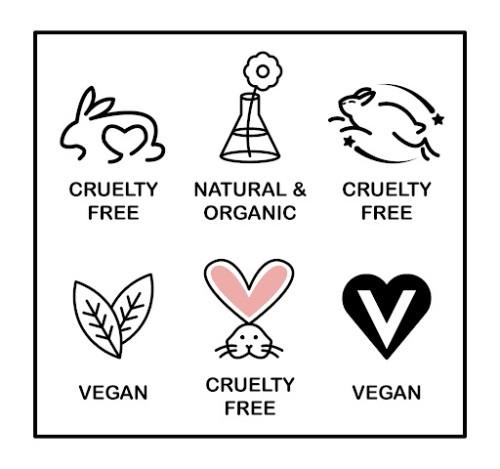
In the 2021 beauty landscape, we hear a lot about cruelty-free beauty. But what does the term mean exactly? Let’s take a look behind the labels on your favourite beauty products and clear up the confusion.
When you see the term “cruelty-free” on a product, this means it hasn’t been tested on animals; but, as there’s no single globally accepted legal definition of the phrase, it can be difficult to establish with certainty whether animals were harmed in the making of a product at some point in its supply chain.
In the UK and EU, the use of animal testing for cosmetics is prohibited. It’s also illegal in other countries, such as Australia, New Zealand, Norway, Switzerland, India, Israel, Turkey and more. It looks as though many other countries around the world are set to follow suit, with their own laws that would ban animal testing for cosmetics.
This all sounds pretty straightforward. Surely all cosmetic products sold in the UK should be cruelty-free? Well, this is where it gets a bit more complex, as different animal protection groups each have their own standards to meet for certification.
For example, while Cruelty Free International’s Leaping Bunny certification requires supply chains to be checked right down to ingredient manufacturer level, other groups focus only on testing practices of the finished product. This can be misleading, making it possible for items to be labelled as cruelty-free even if they contain individual ingredients that have been tested on animals.
Another issue, as noted by PETA, is that UK and EU laws on animal testing for cosmetics enable companies to have their products and ingredients tested on animals in places such as China, while still selling these products in European stores. As long as tests aren’t used to demonstrate product safety for UK or EU standards, companies may still continue to pay for animal testing to allow them to sell in other markets such as China, where animal testing is a requirement.
Cruelty-free beauty companies ensure their commitment to no animal testing by using alternative test methods throughout their supply chains. Non-animal testing includes in vitro testing, computer modelling and research with human volunteers. As technology has advanced, these methods have become more accurate than animal testing in predicting potential adverse reactions to ingredients or substances in humans. They’re also typically less expensive and time-consuming for companies to adopt.
Cruelty-free and vegan beauty products are not one and the same, which can also be confusing to consumers looking to shop more sustainably. Products labelled as vegan contain no ingredients that derive from animals, but this doesn’t necessarily mean that the ingredients haven’t been tested on animals.
Similarly, there are some cruelty-free products out there that don’t test on animals but may include animal-derived ingredients, so it’s important to be aware of what you’re buying, do your research and always read the label.
There are some cosmetic treatments that are vegan and cruelty-free and others that may not be. For instance, the botulinum toxin protein used in Botox injections is vegan, but as it’s classified as a medical product, it’s historically been required by law to be tested on animals. This is the case with all conventional medicines.
More recently, a cell-based test has been approved for use in Botox testing across the USA and Europe, which means that animal testing for this product should soon be eliminated entirely. Just as they would when purchasing any other beauty product, vegans and non-vegans alike must decide for themselves whether Botox is a treatment they’d be comfortable with once its history relating to animal testing is in the past.
If you’re looking for a cosmetic treatment that’s 100% vegan and cruelty-free, micro-needling could be a good fit for you. This rejuvenating facial treatment is a natural, non-surgical procedure that’s suitable for all skin types, designed to smooth out the skin and improve colouration. The treatment stimulates collagen and elastin production by creating micro-injuries, resulting in smoother, firmer and younger-looking skin.